
Table of Contents:
Working to develop good relationships with grantees is essential for grantors. Grantors depend on grantees to use grant resources responsibly and responsibly deliver results. Positive change through grants is at its best when grantors and grantees work together, using their combined resources to influence health care, community development, social services and education. If grantor-grantee relationships have trusting foundations, you can depend on each other when it counts.
If you’re looking to maximize the efficiency and impact of your grants, investing in better grantee relationships can give you the boost you need. When you can show your partners you’re dedicated to supporting them and meeting your combined goals, you’ll motivate them to work harder and more efficiently. Let’s break down grantor-grantee relationships and how you can use communication, reliability and grant management to deliver better, more successful projects.
In grant management, the grantor is the person or entity that gives the grantee the grant. Grantees receive a grant from the grantor and, therefore, get the financial assistance they need for their project. A grantor might be a private donor, the government, corporations or foundations. Good relationships with grantors are essential since grantors give grantees the resources and funding they need for their cause or research.
Grantors don’t just provide the grant — they often have set guidelines and objectives grantees must follow for grant application and execution. Grantees have to work within these lines to qualify for the grant and use it for their project. Since grantors significantly influence grant purpose and scope, a good relationship with grantees is essential for proper fund management and successful project outcomes.
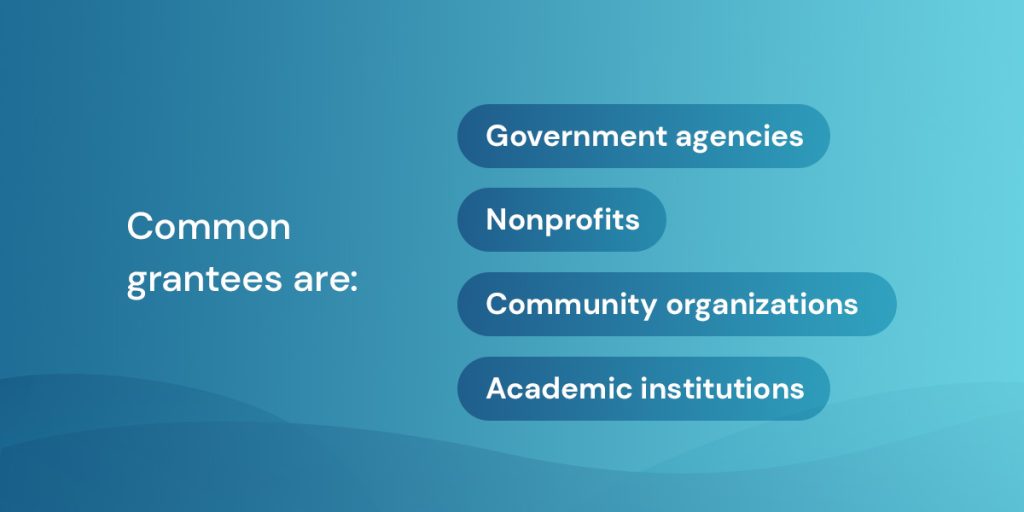
The grantee is the person, organization or entity who receives the grant and the financial assistance that comes with it. Grantees have projects, goals or research that need funding, and grantors provide grantees with this funding. Common grantees are government agencies, nonprofits, community organizations and academic institutions. A good relationship with a grantee means funding goes to projects with values and missions that align with grantors’.
Grantees work to obtain grants by submitting proposals and outlining what they will use the assistance for. Once picked by a grantor, grantees work to meet goals, communicate with grantors and create change. With a solid grantor-grantee relationship, this process goes more smoothly, and grants get to be used to create impactful projects.
A solid grantor-grantee relationship is the foundation of good grant management. Grantors and grantees work together to achieve shared goals, using each others’ strengths to get a better result. Your connection is essential because it’s where your collaboration starts — solid trust and teamwork lead to more successful project outcomes.
The better you can connect with your partners, the more they’ll trust you, and the easier they’ll be to work with. Close connections create smoother work processes and free you up to focus on creating the best grant possible. Understanding how to build up these relationships will help you optimize your grant management process.

Creating strong grantee and grantor relationships is all about openness and communication. Grant management involves lots of moving parts — taking the time to invest in your relationships will help make grant management easier and less stressful. While every relationship is different, you can use the tips as a starting point for cultivating a close, effective grantor-grantee relationship.
A successful grantor-grantee relationship starts with setting clear expectations. At the start of any grant, everyone needs to understand their roles, responsibilities and goals. Work together to create a plan that outlines what everyone will do and work toward throughout the grant management process.
You should also detail what the grantor wants to achieve and how the grantee will execute the project. Having these expectations laid out helps prevent miscommunication. It also makes the process smoother, stopping misunderstandings and giving everyone something concrete to reference.
Here are some essential questions to answer when defining expectations:
With clear expectations, both parties will have the tools they need to navigate the grant process successfully. Remember to revisit expectations throughout the project to ensure everyone’s on the same page. This dialogue helps everyone stay focused and lets you rearrange things as challenges arise.

Open communication is a core part of grant management. While you have to set expectations right away, you need open communication to set those expectations, meet goals and build trust effectively. Grantor-grantee relationships need transparency to work effectively, and communication is where that transparency starts.
When grantors and grantees work together, you need frequent and honest conversations. The more open you are with each other, the greater your respect and understanding will be. Grantors and grantees should create clear communication channels that let you address updates, questions and concerns. This clear, formal reporting provides a solid framework for building a relationship.
Additionally, you should promote an atmosphere of openness. Encourage each other to share challenges, successes and knowledge learned. This welcoming atmosphere helps foster trust and collaboration between each party. The more you communicate, the better you’ll work together and the stronger your problem-solving skills will be. You want your partners to feel like their opinions are valued.
Keeping everyone informed helps grantors and grantees navigate obstacles together, make informed decisions and maintain project momentum. You’ll have a stronger grantor-grantee relationship that holds up better to challenges throughout the process.
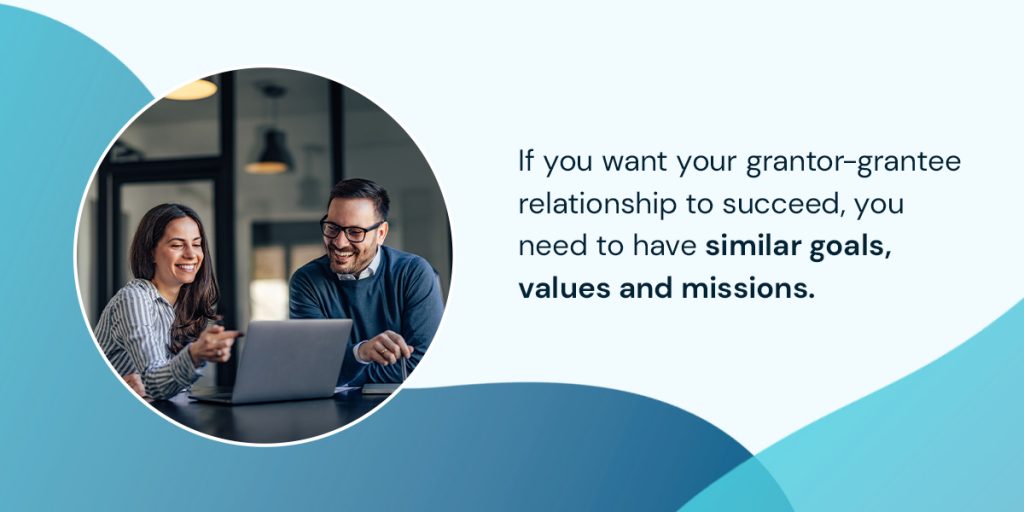
Values are essential to good grant management. Understanding what your operation stands for and what you want to work toward helps you identify potential grants, partners and goals. If you want your grantor-grantee relationship to succeed, you need to have similar goals, values and missions. Sharing your values and mission means both parties have a common understanding of the grant and its intended impact. You’ll prioritize the same things and be motivated through each others’ dedication.
Grantors and grantees need to talk to each other about their missions and the values they try to uphold through their work. You’ll need to sit down and discuss the community and broader impacts you want to have with your grant. Discuss project specifics and the underlying beliefs and motivations driving your commitments.
Values and priorities can change over time — make sure to check in regularly to discuss where everyone’s at. As projects progress and challenges arise, it can be easy to lose sight of these commonalities. Stay in touch to reinforce your shared goals and bring the partnership together even more. If you can remain united and open, your grantor-grantee relationship will have an easier time navigating your projects.
Good partnerships need trust to handle the ups and downs of grant management. If grantors and grantees trust each other, they’ll work together more easily. Having a partner you can trust is invaluable — you can confidently rely on each other’s abilities to get the work done. Stay honest and open, and you’ll establish a solid trust in each other’s opinions.
One essential strategy for building trust is reliability. Consistently delivering on your promises lets your partners know you mean what you say, and they can count on you to carry your share. Everyone needs to meet deadlines, honor grant agreement commitments and provide accurate information to help nurture trust. Strengthen trust with regular progress meetings — meetings let everyone address issues, strategize, ask questions and celebrate success.
You’ll trust each other more when you can check in and see how far you’ve come together.
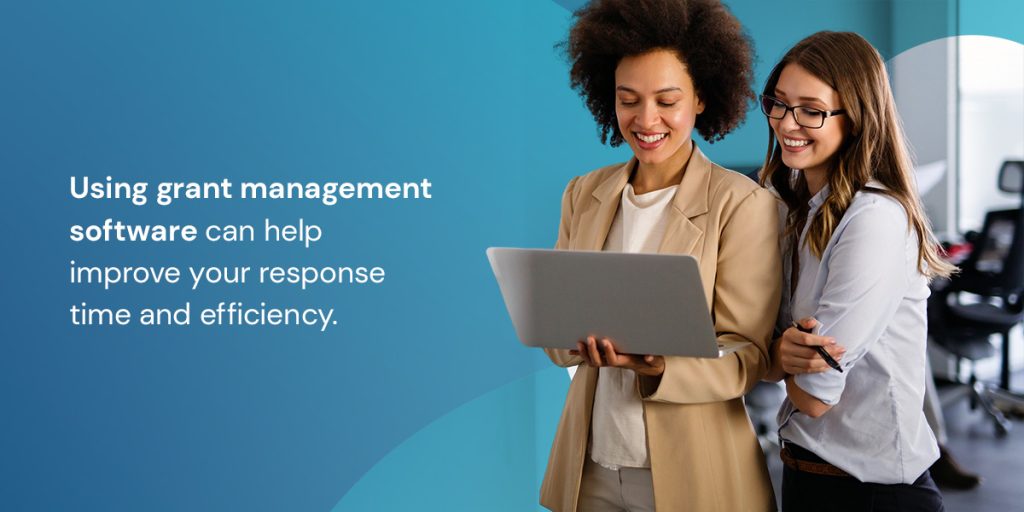
Responsiveness is another component in building strong grantor-grantee relationships. It’s part of communication, but focusing on responsiveness is also a great way to let your partners know you prioritize them and your project together. Stay on top of responding to emails and inquiries — this lets everyone know you want to get everything done on the same timeline as planned. When planning your grant approach together, set clear expectations for response times and keep communication lines clear so everyone knows what to expect.
If you have the resources, try to designate a primary contact person on both sides. Having one person at the head of communication streamlines your project and ensures everything gets across. Instead of asking everyone who to talk to, the designated contact will receive the questions and concerns and direct them to the relevant person. Additionally, using grant management software can help improve your response time and efficiency.
Another part of being responsive is addressing challenges promptly. When problems pop up, let everyone know and have them work together to find solutions. Staying on top of challenges and communicating them to everyone helps reinforce your relationship’s strength.
Feedback is a great tool for improving your grantor-grantee relationship. Constructive feedback helps both parties understand what they’re doing great and where they might need adjusting. Start your partnership off by building feedback sessions into your project timeline. With everyone working to provide good feedback, grantors and grantees can work at their best.
To give the best feedback, focus on specific examples and provide good suggestions for improvement. Clear, constructive feedback is the most helpful — it tells someone what to do and how to do it so they can set a straightforward strategy. When you give feedback, you should also acknowledge someone’s successes. Feedback paired with achievements is more motivating. The person receiving feedback gets to know they’re doing a good job while getting some helpful pointers.
Remember to make feedback a two-way street. Grantors and grantees should both offer and receive feedback to get the most out of their partnership. Establishing this dialogue promotes mutual improvement and gets everyone to contribute to the relationship.

Try to stay flexible if you want the grantor-grantee partnership to thrive. Everyone should recognize that plans need tweaking when challenges happen. Staying flexible helps you achieve success even when surprises happen. Grantors and grantees should set realistic expectations from the start and talk about adjustments that might need to occur along the way.
One effective strategy could be building flexibility into your project. Leave timelines and budgets with some wiggle room so you can pivot when roadblocks show up. Regular check-ins on challenges and progress are great for staying flexible since they allow you to adjust when the problem occurs instead of finding out at the last minute.
Grantors and grantees should also stay open to alternative approaches. Collaborating on challenges and pivoting strategies helps create stronger bonds. When you remain adaptable and overcome obstacles together, it reinforces your sense of community. Remember that flexibility is about navigating challenges together, not abandoning your goals. Work together, adapt, and you’ll stay on track.
While keeping everything open and grant-focused is a great start, you need to invest in the grantor-grantee relationship. Project management is work-focused — you’ll build stronger bonds by cultivating professional and personal connections with your partners. The more you get to know your partners, the better you’ll work together and the more united you’ll be.
Try to set times for activities that promote connection. Visiting project sites and having casual, non-grant-focused conversations are great for building trust and understanding. Take time to invest in the human aspect of grant management to really build up that grantor-grantee partnership. Talk about yourself, but also listen. Actively listening lets the other party know you value what they have to say. If your partners know you value their opinions, they will do the same, and you’ll have a better relationship.

While working through challenges is motivating, celebrating success brings grantors and grantees together. Acknowledging everyone’s achievements — no matter the size — reinforces your partnership.
Use milestone celebrations to encourage morale and strengthen relationships. Set up mini goals that grantors and grantees can commemorate together to create a more motivating atmosphere. Getting through the grant process and achieving your goals can be challenging. Small rewards and celebrations can push more energy into the project, and a motivated team is a hard-working team.
Additionally, you can publicly recognize team efforts through newsletters, social media and websites. Broadcasting success makes team members feel valued and shows the impact of your partnership. Use regular updates on key milestones and success stories about your grant to show your mutual appreciation. Celebrating together creates a feeling of shared success and helps build a culture of appreciation in your partnership.
Everyone loves to stop and celebrate when they accomplish a goal, but you should also promote growth in your grantor-grantee partnership. Continuous improvement keeps everyone motivated and helps sustain the relationship long-term. Encourage everyone to learn from experiences and invest in collaboration sessions to refine your strategies. Paying attention to strengths and weaknesses helps your partnership become stronger and more successful.
Feedback is a great way to invest in continual growth. Additionally, encourage everyone to invest in professional development opportunities. Working on these skills as a team improves your partnership’s abilities and increases your chance of success. Committing to growth shows you want the partnership to thrive.
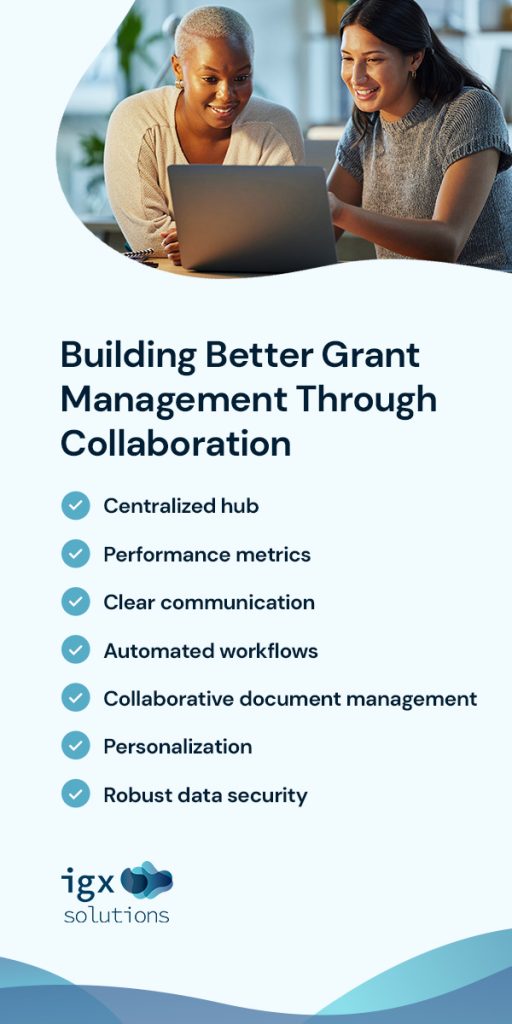
Effective grant management and successful grantor-grantee partnerships go hand-in-hand. Investing in a quality grant management service helps you work more collaboratively and seamlessly. The right software will make the process easier while encouraging your partnership to grow and succeed.
Here’s how you can leverage grant management software to maximize your partnership’s grant management potential:
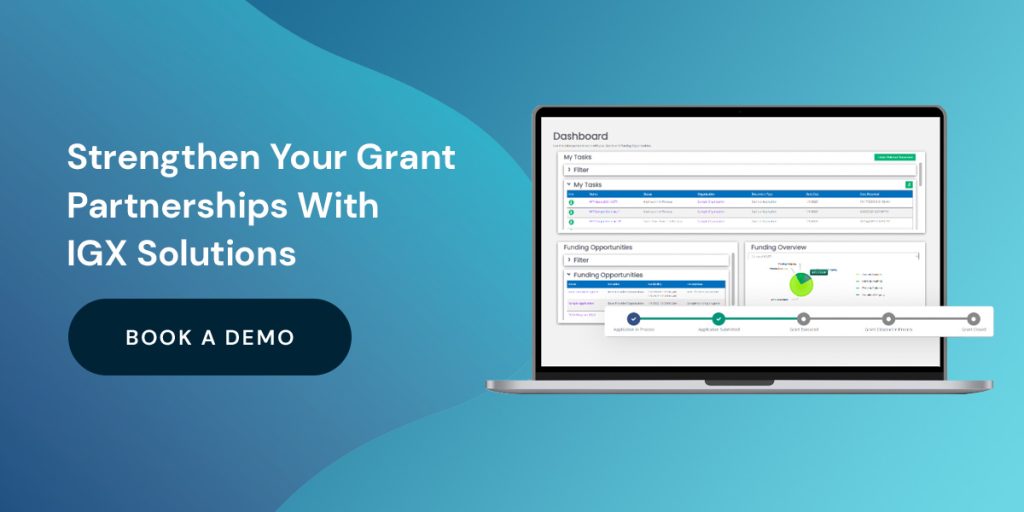
If you want to make grant management easier, more collaborative and highly efficient, choose IGX Solutions’ IntelliGrants IGX®. Our IntelliGrants IGX software is a dedicated, configurable grant management software designed to strengthen your grantor-grantee partnership.
Use our intuitive platform to communicate efficiently with parties, stay on top of grant goals and foster a collaborative spirit. With personalized grant applications, automated workflow and streamlined reporting, you can work together to build an effective grant management strategy.
Get secure, efficient grant management with IntelliGrants IGX. Our software is ready to go after a simple configuration to your needs. You’ll hit the ground running with software designed to streamline your grant management. Let us help you transform your grant management process — book a demo today!